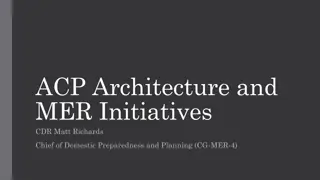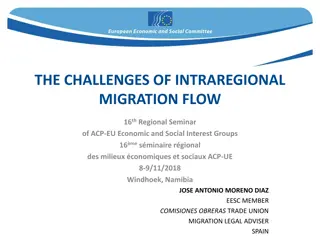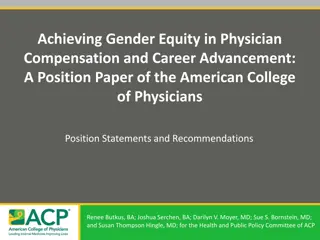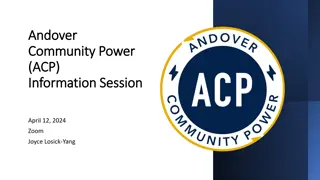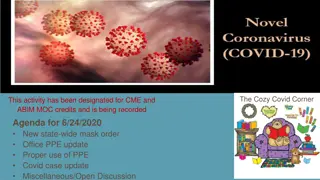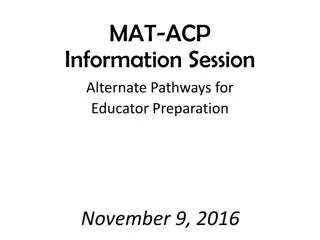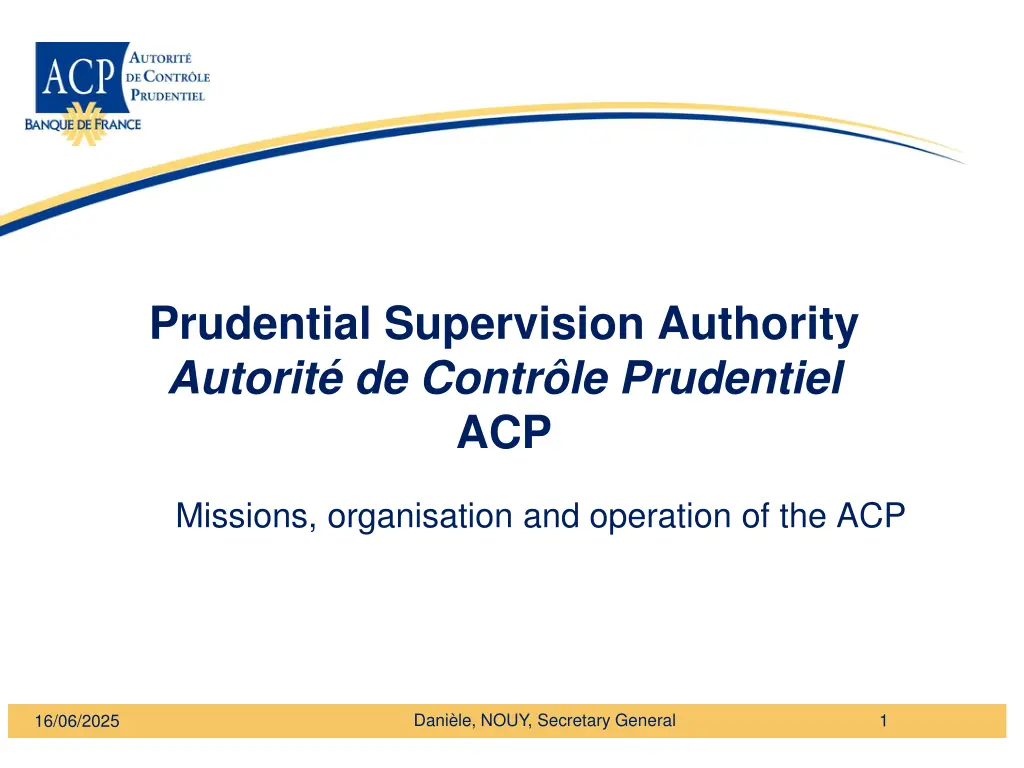
Prudential Supervision Authority: Missions, Structure, and Powers
Learn about the Prudential Supervision Authority (ACP) and its pivotal role in overseeing the insurance and banking sectors. Explore its combined missions, adapted organizational structure, harmonized supervision practices, and expanded powers. Gain insights into the independent administrative agency's functions, compliance oversight, and mechanisms for ensuring stability within the financial system.
Download Presentation

Please find below an Image/Link to download the presentation.
The content on the website is provided AS IS for your information and personal use only. It may not be sold, licensed, or shared on other websites without obtaining consent from the author. If you encounter any issues during the download, it is possible that the publisher has removed the file from their server.
You are allowed to download the files provided on this website for personal or commercial use, subject to the condition that they are used lawfully. All files are the property of their respective owners.
The content on the website is provided AS IS for your information and personal use only. It may not be sold, licensed, or shared on other websites without obtaining consent from the author.
E N D
Presentation Transcript
Prudential Supervision Authority Autorit de Contr le Prudentiel ACP Missions, organisation and operation of the ACP Dani le, NOUY, Secretary General 1 16/06/2025
Outline 1. Introduction: the nature of the Prudential Supervision Authority 2. Combined, broadened missions 3. Organisational structure adapted to the specificities of the two sectors 4. Harmonised supervision 5. Expanded powers 16/06/2025 2 Dani le, NOUY, Secretary General
1. Introduction The ACP is the product of the merger of the licensing and supervisory authorities (the CEA, the CECEI, ACAM and the Commission Bancaire) for the insurance and banking sectors. Established by Order n n 2010-1249 of 22 October 2010 and codified in Articles L. 612-1 et seq. of Title I, Book VI of the French Monetary and Financial Code. 2010-76 of 21 January 2010, ratified by statute Assumed its functions on 9 March 2010, the date of its first plenary session. 16/06/2025 3 Dani le, NOUY, Secretary General
1. Introduction The ACP is an independent administrative authority charged with preserving the stability of the financial system and protecting the customers, insurance policyholders, members and beneficiaries of the persons that it supervises. The ACP oversees the compliance of these persons with the provisions of: - The Monetary and Financial Code; - The Insurance Code; - Book IX of the Social Security Code; - The Mutual Insurance Code; - Book III of the Consumer Code; - Industry codes of conduct approved by the Minister of the Economy; along with all other legislative and regulatory provisions, violations of which constitute a breach of one of the codes listed above. 16/06/2025 4 Dani le, NOUY, Secretary General
1. Introduction 1.1 The ACP is an independent administrative agency without legal personality Its independence is ensured: By its collegial form of organisation By the status of its members, who include: - representatives of government authorities, and magistrates; - qualified experts and retired professionals. and who are covered by ethics rules to avoid conflicts of interest: - no practicing professionals (incompatibility); - procedures for suspension or compulsory dismissal; - internal procedures; - recusal procedures for members of the Sanctions Committee. 16/06/2025 5 Dani le, NOUY, Secretary General
1. Introduction 1.1 The ACP is an independent administrative authority The various groupings of the ACP and their membership COLLEGE (19 members) Plenary Session (19 members) Sanctions Committee (6 members) The Chairman (the Governor of the Banque de France), the chairman of the Autorit des march s financiers, the chairman of the Autorit des Normes Comptables, a Conseiller d Etat, a Conseiller at the Courde Cassation and a Conseiller-ma tre at the Courdes Comptes, a Vice-chairman with experience in insurance, four members with experience in insurance, four members with experience in banking, two members appointed by the respective chairmen of the two Houses of Parliament and two other experts. The chairman (a Conseiller d Etat) A 2ndConseiller d Etat A Conseiller at the Cour de Cassation Three expert members nominated by the Minister for the Economy Members Restricted Session (8 membres) The Chairman (the Governor of the Banque de France), the Vice-chairman, two of the four members with experience in insurance, two of the four members with experience in banking, and two members chosen from among the following: the chairman of the ANC, the Conseiller d Etat, the Conseiller at the Courde Cassation, the Conseiller-ma tre at the Cour des Comptes, and the two other experts Consultative committees A majority of whose members are professionals from the banking and insurance sectors Banking sectoral sub-college (8 members) Insurance sectoral sub-college (8 members) Staff General Secretariat (950 staff members) 16/06/2025 6 Dani le, NOUY, Secretary General
1. Introduction 1.1 The ACP is an independent administrative authority Two Government officials attend meetings of the ACP: The Director General of the Treasury (DT) Attends meetings of all ACP sessions Attends meetings of the insurance sub- college, and other sessions when they are discussing organisations governed by the Mutual Insurance Code or the Social Security Code. The Director of Social Security (DSS) They have no vote on the College, but can request a second deliberation, except on matters of sanction; They do not attend deliberations of the Sanctions Committee. 16/06/2025 7 Dani le, NOUY, Secretary General
1. Introduction 1.1 The ACP is an independent administrative authority without legal personality Its independence is ensured: By the five-year term of office of College members, and by the collegial nature of the decision-making body; By the ACP s functional autonomy: - financial autonomy (contributions are collected from subject persons to cover the cost of supervision, and the proceeds are allocated to the ACP); - the organisational independence of its services. 16/06/2025 8 Dani le, NOUY, Secretary General
1. Introduction 1.2 The ACP is attached to the Banque de France The ACP is chaired by the Governor of the Banque de France The Vice-chairman is a member of the General Council of the Banque de France This relationship reflects the complementary missions of the ACP and the central bank in the area of financial stability: - The ACP and the Banque de France cooperate and exchange information in the conduct of their respective missions, particularly in the area of financial stability; - The ACP relies on the missions and expertise of the Banque de France in matters relating to means of payment, interbank payment systems and other market infrastructures. 16/06/2025 9 Dani le, NOUY, Secretary General
1. Introduction 1.2 The ACP is attached to the Banque de France The relationship also concerns financial and human resources: - Personnel: staff members are employed by the Banque de France and assigned to the ACP; - Budget: the ACP s activities are financed by a contribution for the cost of supervision collected by the Banque de France. The ACP s budget, which forms an annex to the budget of the Banque de France, is approved by the ACP s College. The Banque de France can provide an additional allocation to the ACP. 16/06/2025 10 Dani le, NOUY, Secretary General
1. Introduction 1.3 The Sanctions Committee In accordance with the 11 June 2009 ruling of the European Court of Human Rights in Dubus S.A. v. France, the ACP is composed of a College and a Sanctions Committee. There is an organic functional separation within the ACP between the investigation phase of supervision, which is the responsibility of the College, and the disciplinary phase, which is the responsibility of the Sanctions Committee. The Sanctions Committee is charged with conducting disciplinary proceedings referred to it by the College, and with issuing penalties where appropriate. The functions of a member of the Sanctions Committee are incompatible with those of a member of the College. 16/06/2025 11 Dani le, NOUY, Secretary General
Outline 1. Introduction: the nature of the Prudential Supervision Authority 2. Combined, broadened missions 3. Organisational structure adapted to the specificities of the two sectors 4. Harmonised supervision 5. Expanded powers Dani le, NOUY, Secretary General 16/06/2025 12
2. Combined, broadened missions 2.1 Scope of supervision Supervision covers all organisations in the banking and insurance sectors, including: Banking sector Insurance sector Credit institutions Insurance and reinsurance companies Investment firms Mutual insurance companies and unions Payment institutions Financial holding companies Provident institutions Bureaux de change 16/06/2025 13 Dani le, NOUY, Secretary General
2. Combined, broadened missions 2.1 Scope of supervision The ACP also has the authority to supervise intermediaries in the insurance, mutual and banking sectors. The extension of supervision to intermediaries involved in banking and payment service operations is the result of Order n 2010-76 of 21 January 2010. Supervision focuses on banking and insurance activities: - The microcredit institutions mentioned in paragraph 5 of Article L. 511-6 of the Monetary and Financial Code are included in the scope of the ACP s supervision; - Mutual societies that do not conduct insurance business are no longer subject to supervision. 16/06/2025 14 Dani le, NOUY, Secretary General
2. Combined, broadened missions 2.2 Nature of the ACP s missions Licensing and authorisation Ongoing supervision Paragraph 2 of Article L. 612-1 of the Monetary and Financial Code states that the ACP is charged with on-going supervision of the financial condition and the operating conditions of [subject] persons . In particular, the ACP is charged with supervising: - compliance with solvency requirements (all sectors); - compliance with liquidity requirements (credit institutions); and - ability to meet commitments (insurance sector). 16/06/2025 15 Dani le, NOUY, Secretary General
2. Combined, broadened missions 2.2 Nature of the ACP s missions The ACP has been assigned a new mission: customer protection 1) Supervising subject persons compliance with the laws and regulations that apply to them and with codes of conduct approved on demand of a professional association, as well as both rules of good practice issued by the ACP and those resulting from recommendations of the ACP; 2) Ensuring that subject persons devote adequate resources and adopt suitable procedures for complying with provisions relating to consumer information and contract formation (Book 1 of the Consumer Code). 16/06/2025 16 Dani le, NOUY, Secretary General
2. Combined, broadened missions 2.2 Nature of the ACP s missions 3) Establishment by the ACP and the AMF of a joint body to: - coordinate supervisory priorities for ensuring compliance with customer protection requirements; identify risk factors in this area and coordinate the monitoring of marketing campaigns; - - provide a single query point for complaints from customers of subject institutions. The activities of the joint body are detailed in an annual report. 16/06/2025 17 Dani le, NOUY, Secretary General
Outline 1. Introduction: the nature of the Prudential Supervision Authority 2. Combined, broadened missions 3. Organisational structure adapted to the specificities of the two sectors 4. Harmonised supervision 5. Expanded powers Dani le, NOUY, Secretary General 16/06/2025 18
3. Organisation of the Secretariat 3.1 The General Secretariat of the ACP This is the name given to the services of the ACP, which implement its decisions. The Secretariat s 950 staff members are employed by the Banque de France and assigned to the ACP. The staff of the ACP, as well as all persons who participate or who have participated in the conduct of its missions, are bound by professional secrecy. 16/06/2025 19 Dani le, NOUY, Secretary General
3. Organisation of the Secretariat 3.2 The Secretary General The General Secretariat of the ACP is organised and directed by a Secretary General named by the Minister for the Economy, following proposal from the Chairman of the ACP. The General Secretary is assisted by several Deputy Secretary Generals A Senior Deputy Secretary General, possessing experience in either insurance or banking to complement that of the Secretary General, is named by the Chairman of the ACP with the concurrence of the Vice-Chairman and the approval of the Ministers for the Economy, Social Security and Mutuality. 16/06/2025 20 Dani le, NOUY, Secretary General
3. Organisation of the Secretariat 3.3 Responsibilities of the Secretary General The Secretary General makes proposals to the College concerning: - the organisation of the Secretariat; - the ethics rules that apply to the staff; - the general framework for staff recruiting and employment; - the budget. The Secretary General organises and directs the Secretariat of the ACP: - He or she administers the budget; - He or she oversees the recruiting and management of ACP staff on behalf of the Banque de France; - He or she organises the Secretariat, following the guidelines adopted by the College. 16/06/2025 21 Dani le, NOUY, Secretary General
3. Organisation of the Secretariat 3.4 The General Secretariat Organisation chart 16/06/2025 22 Dani le, NOUY, Secretary General
Outline 1. Introduction: the nature of the Prudential Supervision Authority 2. Combined, broadened missions 3. Organisational structure adapted to the specificities of the two sectors 4. Harmonised supervision 5. Expanded powers Dani le, NOUY, Secretary General 16/06/2025 23
4. Operation 4.1 The College: responsibilities of the different groupings The College in plenary session General matters - matters relating to financial stability - supervisory priorities - principles relating to organisation and operation - budget - internal procedures The College in restricted session 1- Cross-cutting issues: - institution-specific matters relating to complementary supervision of regulated entities belonging to a financial conglomerate - the review of acquisitions, increases and disposals of equity investments that could have a significant effect on entities in both the banking and insurance sectors 2-Issues decided by the Chairman or the Vice-chairman: - Institution-specific matters limited to a single sector that have implications for financial stability Banking and insurance sectoral sub-colleges - institution-specific and general matters that are specific to one sector Special committees The College can establish special committees to deal with specific issues as outlined in a mandate provided by the College. Dani le, NOUY, Secretary General 16/06/2025 24
4. Operation 4.2 The College: procedural rules The agenda for meetings of each of the various groupings of the College is set by the Chairman of the ACP. For meetings of the insurance sub-college, the agenda is set by the Chairman based on a proposal from the Vice-chairman. Meetings of each grouping of the College are called by its chairman. Rulings can be made by conference call, except on sanction matters; or by written procedure when the Chairman of the ACP declares an urgent need. Quorum - For the various groupings of the College: majority of the members; - For the Sanctions Committee: 3 of the 5 members. Dani le, NOUY, Secretary General 16/06/2025 25
4. Operation 4.3 Delegation of responsibilities The College may delegate certain responsibilities to the Chairman or the Secretary General: Administrative procedures (with the exception of injunctions (reinforcing the financial situation of the entity, its structure and organisation or capital adequacy requirements) and the initiation of disciplinary proceedings cannot be delegated. enforcement orders), Licensing, authorisations of holding acquisitions, and enforcement orders may be delegated to the Chairman. All delegations granted are published in the Official Journal of the French Republic. Dani le, NOUY, Secretary General 16/06/2025 26
Outline 1. Introduction: the nature of the Prudential Supervision Authority 2. Combined, broadened missions 3. Organisational structure adapted to the specificities of the two sectors 4. Harmonised supervision 5. Expanded powers Dani le, NOUY, Secretary General 16/06/2025 27
5. Powers 5.1 Licensing and authorisations The ACP has powers of licensing and authorisation: - licensing, extensions and exemptions; - holding acquisitions and changes in control; - changes in management; - single European passport (right of establishment and freedom to provide services). The ACP must be consulted on all proposals to name statutory auditors, or to renew their terms, at organisations subject to the ACP s ongoing supervision. Dani le, NOUY, Secretary General 16/06/2025 28
5. Powers 5.2 Conduct of supervision The ACP determines the set of documents and information that are to be provided to it periodically, along with their form, frequency, and the deadlines for reporting. The ACP may also draw up model forms for submitting requests, including requests for licensing. These requirements are set out in instructions which are issued by the ACP following consultation with a consultative committee whose membership includes industry representatives. The ACP may issue an injunction accompanied by a fine in the event that a subject person fails to make a required declaration or to transmit required reports, documents or periodic data. Dani le, NOUY, Secretary General 16/06/2025 29
5. Powers 5.2 Conduct of supervision The Secretary General conducts on-site and off-site supervision: - the controllers conducting ongoing supervision are accredited with the persons subject to their supervision; - the Secretary General also conducts on-site inspections whose scope is defined in letters of engagement. The Secretary General can also call upon: - French authorities and supervisory bodies charged with complementary missions; - authorities exercising similar functions in other States; - persons who are not associated with any of these authorities. Dani le, NOUY, Secretary General 16/06/2025 30
5. Powers 5.2 Conduct of supervision controllers may: - Examine and obtain a copy of any document relating to the situation or the transactions of the supervised person; - Conduct any type of verification of cash or asset portfolios; - Obtain access to computing tools and data. Dani le, NOUY, Secretary General 16/06/2025 31
5. Powers 5.2 Conduct of supervision Obligation to provide an opportunity to comment - At the conclusion of each on-site inspection, an examination report is drawn up. The draft report is shared with the managers of the supervised person, which may provide comments that will be included in the final examination report. - A follow-up letter is sent to the supervised person s Board of Directors, to its Executive Board and its Supervisory Board, or to the corresponding deliberative body. The follow-up letter may also be communicated to other persons, such as the institution s statutory auditor, the companies that control the supervised institution, or the central bodies or organisations with which it is affiliated. Dani le, NOUY, Secretary General 16/06/2025 32
5. Powers 5.3 Administrative authority The ACP has a broad range of administrative actions at its disposal: - It combines the different powers of its predecessors : warnings (mises en garde), enforcement orders, remedial action programme, and special supervision; - Thus it has an expanded capacity for action. Dani le, NOUY, Secretary General 16/06/2025 33
5. Powers 5.3 Administrative authority Protective measures: Placement under special supervision Temporary restrictions or prohibition on conducting certain types of transactions Temporary suspension, restrictions or prohibition on the free disposal of some or all of the assets of the supervised person Orders to suspend or limit the payment of surrender values, insurance arbitrage, the extension of loans on policies, or the right to grant withdrawals from insurance policies Compulsory transfer of some or all of the institution s portfolio of insurance contracts or mutual instalments Limitations or prohibition dividends to shareholders or on the payment of interest to partner shareholders Suspension of one or more managers administrative actions Warnings (mises en garde) Enforcement orders Remedial action programmes Protective measures Appointment of a provisional administrator on the distribution of Dani le, NOUY, Secretary General 16/06/2025 34
5. Powers 5.3 Administrative authority The ACP has suitable tools at its disposal for ensuring the protection of customers It may issue warnings (mises en garde) to persons whose practices: - could damage the interests of customers; - or violate customary business practices. In addition, the ACP may release to the public any information that it considers necessary to the accomplishment of its missions. Dani le, NOUY, Secretary General 16/06/2025 35
5. Powers 5.3 Administrative authority Requirement to provide a hearing When a grouping of the College considers taking an administrative action, it notifies the person who is the object of the measure, informing it of the possible grounds for the action. The person then has five days in which to provide written comments (for all types of administrative actions). In addition, the person s legal representative is summoned to present oral comments before the College (for protective measures and the appointment administrator). of a provisional The person may be assisted or represented at this hearing by the persons of his choice. Dani le, NOUY, Secretary General 16/06/2025 36
5. Powers 5.4 Sanction authority: violations which may be penalised failure to comply with applicable laws and regulations; failure to submit a remedial action programme requested by the ACP; failure to heed a warning (mise en garde), enforcement order or injunction; failure to comply with specific conditions imposed or commitments made in connection with a request for license, authorisation or exemption. Dani le, NOUY, Secretary General 16/06/2025 37
5. Powers 5.4 Sanction authority: applicable sanctions The Sanctions Committee may impose the following penalties on organisations that are subject to ongoing supervision: 1- warning (avertissement); 2- reprimand; 3- prohibition on conducting certain transactions, for a period of up to ten years; 4- temporary suspension of managers, for a period of up to ten years; 5- compulsory dismissal of managers; 6- partial or total withdrawal of license or authorisation; 7- striking from the list of licensed persons. A fine of up to 100 millions euros may be imposed either in addition to or in place of these penalties. Dani le, NOUY, Secretary General 16/06/2025 38
5. Powers 5.4 Sanction authority: sanctions applicable to specific subject persons The list of penalties is tailored to the characteristics of each category of subject institution: - financial holding companies and mixed financial holding companies; - mutual insurance companies and unions governed by Book I of the Mutual Insurance Code; - insurance, banking, and payment services intermediaries; - bureaux de change. The maximum fine is reduced to 1 million Euros for: - mutual insurance companies and unions governed by Book I of the Mutual Insurance Code; - insurance, banking, and payment services intermediaries; - bureaux de change. Dani le, NOUY, Secretary General 16/06/2025 39
5. Powers 5.4 Sanction authority: issuance of penalties The Sanctions Committee can issue one or more penalties, depending on the seriousness of the violation (principle of proportionality). Penalties apply to the organisation. However, a proceeding directed at a legal entity can lead to the imposition of sanctions concerning the managers of the entity (temporary suspension or compulsory dismissal). Penalties imposed by the committee may be accompanied by fines of up to 15,000 Euros per day. The Sanctions Committee publishes its decisions in newspapers, other publications, or other vehicles of its choice. Dani le, NOUY, Secretary General 16/06/2025 40
5. Powers 5.4 Sanction authority: disciplinary proceedings Disciplinary proceedings are initiated by the College, which sends a letter notifying the person concerned of the allegations and informing him that the matter has been referred to the Sanctions Committee. The person concerned is afforded the opportunity to respond to the Sanctions Committee: - the person may submit written comments to the Commission; - oral arguments may be presented at a public hearing (unless the person waives the hearing). A member of the Sanctions Committee may be recused: - on his own initiative, or - at the request of the object of the allegations. Dani le, NOUY, Secretary General 16/06/2025 41
5. Powers 5.4 Sanction authority: appeals to the decisions of the Sanctions Committee The process involves a plenary appeal before the Conseil d tat (administrative supreme court). An appeal may be initiated by: - the sanctioned entity; - the Chairman of the ACP, with the approval of the College grouping that issued the notification of the allegations. Dani le, NOUY, Secretary General 16/06/2025 42
5. Conclusion The Prudential Supervision Authority was created by the government in order to: Draw lessons from the financial crisis and maintain financial stability; Provide greater protection to the customers of financial institutions; Strengthen the voice of French supervisors in the international supervisory community; Improve the effectiveness of supervision. ACP does more than simply aggregate the powers and the human and financial resources of its predecessors. It devotes these resources to the accomplishment of an expanded set of supervisory missions. Dani le, NOUY, Secretary General 16/06/2025 43





